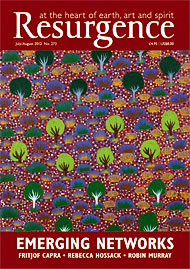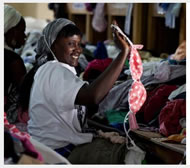Walk onto any high street and you will see the familiar signs: Starbucks, WH Smith, Boots, Argos, Tesco, as well as a myriad of other retail outlets urging hungry consumers to part with their hard-earned cash. But peeping out of the same high street are Oxfam, British Heart Foundation, Cancer Research UK and countless other charity shops.
The last decade has seen the steady rise of the charity shop. With its emphasis on recycling, Oxfam is an example of one putting its money where its mouth is and ensuring that it is truly sustainable in every sense.
Oxfam is a global humanitarian, development organisation working with others to overcome poverty and suffering. Created in 1942, it now works in almost 60 countries on a range of initiatives, from providing emergency water sources to supporting community health projects.
It opened its first shop in 1948 and now has almost 700 on high streets across the UK selling donated fashion, books, music, homeware and new ethical products, as well as a number of specialist stores including those selling bridal wear.
Oxfam’s trading division has 1,000 paid staff, supported by 22,000 volunteers. Its shops sort and sell donated items each year to raise money for Oxfam’s work with people living in poverty around the world.
Overall Oxfam manages to keep its costs very low: 83 pence of every pound goes on emergency, development and campaigning work, 10 pence is spent on running costs and support, and
7 pence is invested in generating future income.
It is, however, the support from volunteers that ensures the business is run profitably. Fee Gilfeather, Head of Marketing for Oxfam Trading, says: “Anyone can volunteer. If people are interested they should chat with the manager of their local store. We have a wide range of volunteers and are always looking for more.”
Leo James has been a volunteer for six months at his local Oxfam in West Hampstead. He says: “When I think of charity shops I think of Oxfam, and this is a charity I want to support by giving my time to it as it really does what it says.”
Oxfam’s values are also a reason why Sayyid Hussaini shops at his local store. He explains: “On a financial level it is much cheaper buying things in charity shops. But on a spiritual level I feel much better about myself, knowing that what I buy will really help disadvantaged people.”
Lawyer Vicki Prais says: “I enjoy shopping in Oxfam as I like supporting charities that work in the developing world. They usually have a great variety of products to buy. Oxfam is an ethical organisation and I very much support its philosophy.”
Oxfam is also the only major charity to operate its own textile-sorting facility, Wastesaver in Huddersfield. Launched in 1975, it was the first comprehensive waste-recycling scheme set up in Britain. In the intervening years it has continued to maximise revenue from textiles that cannot be resold in shops and thus helps minimise the amount of textiles sent to landfill.
Marketing Chief, Fee Gilfeather points out: “Wastesaver enables us to ensure that absolutely no textiles [donated to Oxfam] end up in landfill. Even if something is damaged, it can still be recycled.”
Wastesaver sorts 80 tonnes of clothing a week into approximately 100 different grades depending on garment type, condition, style and fabric. The clothing is then sold to the most suitable market via a number of different routes, including Oxfam’s high-street shops and festivals and its online shop – the UK’s first online charity shop, opened in 2007.
Items that are unsuitable for the UK market can be sold to designers who restyle garments and reuse fabrics, or to textile wholesalers in the UK and overseas. Items are also sold to recycling and reprocessing companies in the UK, which use them as mattress filler, carpet underlay and upholstery.
Wastesaver sells 14% of its clothing and textiles at market rate to Frip Ethique, a social enterprise in Senegal that sorts and trades second-hand clothes and sells them in the markets of Dakar. Frip Ethique was created in 2006 to provide employment for disadvantaged women and to generate a profit that could be invested in livelihood programmes run by Oxfam in West Africa. The business now employs over 40 people, and in the last financial year it made a profit of £200,000. It improves many women’s lives: they can now feed and clothe their families, send their children to school and afford medicines.
In addition to Wastesaver and Frip Ethique, Oxfam has a Book Barn in Huddersfield, where unsold books can be turned into cash. It takes in 20,000 books a day and converts them into money for worthy causes by selling them in a range of places, including eBay and Amazon.
Fee Gilfeather continues: “Oxfam is always innovating and so our future is excitingly unknown. To continue doing what we do we need donations from the public. Instead of people having things languishing in drawers, we hope that they will have a good clear-out and donate them to us. Every item donated can really make a difference by raising money for Oxfam’s work fighting poverty around the world.”
Angela Palmieri, the manager of West Hampstead Oxfam shop, adds: “I always put myself in the customers’ shoes. They clear up their homes, put their stuff in bags, and travel to bring us their unwanted goods. This takes a lot of time on their part and yet they thank us when they make their donations. But they are enabling us to do our work.”
So, the next time you pop into your local high street, rest assured that some stores really are committed to doing what they say. Oxfam is one such organisation, which makes a real and lasting difference to so many lives.








